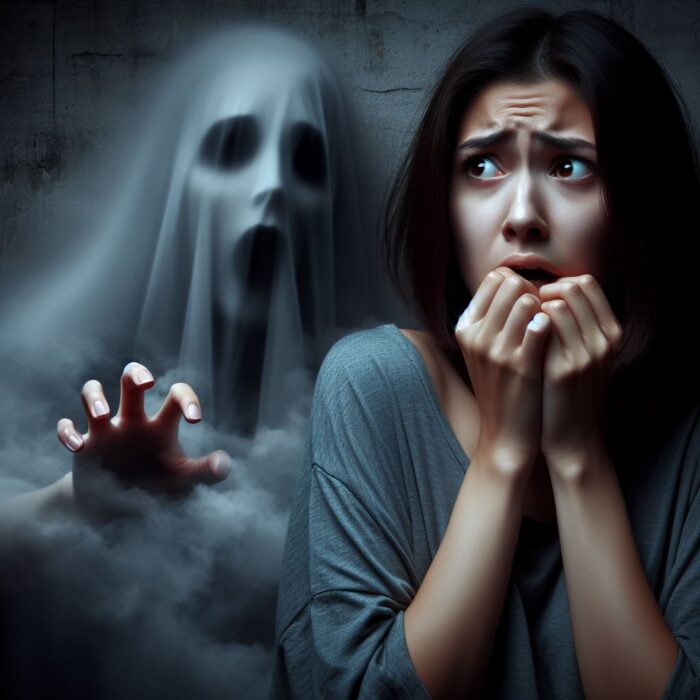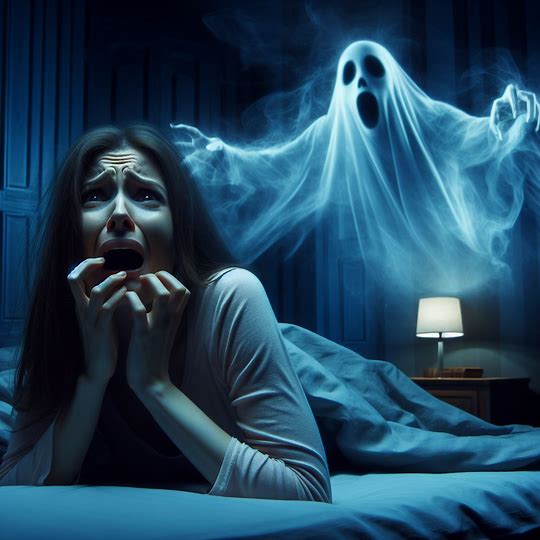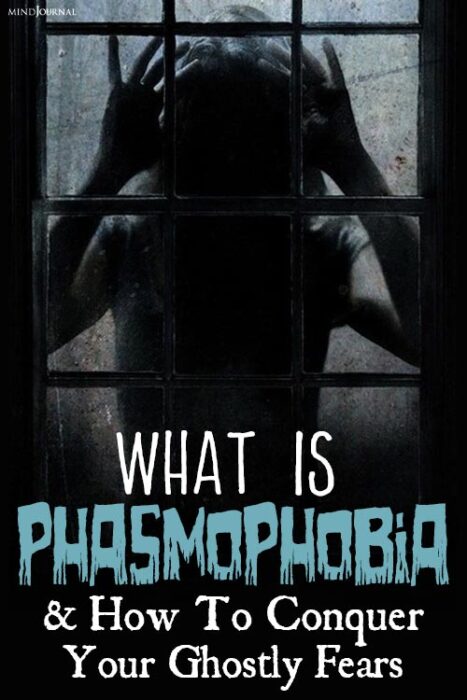Are you afraid of being alone in the darkness? Do unexplained noises or eerie surroundings send shivers down your spine? Are you scared of ghosts? If so, you may be experiencing phasmophobia. What is phasmophobia, you ask? Let’s find out.
Emily woke up in the middle of the night and looked directly at the dark corner of her room. As a battle raged on between curiosity and fear, Emily kept staring into the darkness.
When the floorboard creaked menacingly, she jumped out of her bed and ran out of the bedroom. Little did she know that the culprit wasn’t hiding within the darkness, but in the darkest recess of her own mind. Her own fear of ghosts – phasmophobia.
Today, we will delve into the depths of phasmophobia, an intense and irrational fear of ghosts, exploring its symptoms, causes, and potential phasmophobia treatment options. Moreover, we will also learn some self-help tips that will help you overcome your fear and reclaim control over your emotions.
What is Phasmophobia?
Phasmophobia, derived from the Greek words “phasma” meaning ghost and “phobos” meaning fear, is a specific phobia characterized by an overwhelming and persistent fear of ghosts or supernatural entities.

While it is normal to experience some level of unease or apprehension when confronted with the unknown, phasmophobia takes these feelings to an extreme, significantly impacting an individual’s daily life.
So exactly what is phasmophobia? Researchers define this condition as “an anxiety disorder, which involves the development of fears toward ghosts or entities at an extreme level. This type of phobia occurs as a result of over exposure to ghost stories or horror films”
Related: Are Ghosts Real? Here’s What Science Has To Say
When left unaddressed, it can lead to the onset of other forms of phobias and fears such as fear of darkness, fear of the night, or fear of sleeping alone. Neglecting treatment for this condition can seriously and adversely influence or affect your daily life for a long time.
“This fear will cause one to be passive who always needs help in solving their problems, as he/she will be reluctant to be left alone,” add the researchers. The ability to recognize and acknowledge fear quickly is of utmost importance when it comes to helping individuals with phasmophobia manage the intensity of their fears.
Understanding the Fear of Ghosts
Cognitive, physiological, and behavioral reactions can help us identify the signs of this gripping phobia.
The cognitive reactions are basically distorted and false perceptions of reality, where you may genuinely believe that ghosts exist and are out to harm you. As a result you may begin to imagine or visualize the presence of a malevolent entity.
These cognitive reactions, in turn, trigger negative behavioral responses such as wincing, crying, shouting, and trembling. As the fear intensifies, avoidance behaviors may take hold, compelling you to physically run away from the entity that you have imagined.
For instance, in the case of Emily above, through vivid mental imagery of a spectral presence, Emily made herself sincerely believe that a ghost is standing in the dark corner of her room and it poses a real threat to her. Due to her perceived fear and distorted sense of a looming threat, Emily ran out of the room.
Apart from these, physiological reactions also tend to arise simultaneously with cognitive and behavioral responses. This can lead to an “increased heart rate, blood pressure, brain wave and skin conductance.”
By understanding the complexities of what is phasmophobia and its mental, physical, and behavioral responses, we can explore effective treatments to help individuals overcome their fears.
Phasmophobia Symptoms
Ever felt your heart race at a shadowy figure or heard mysterious whispers? Dive into the spine-tingling world of phasmophobia symptoms.
1. Intense Anxiety
Those with phasmophobia often experience intense anxiety or panic attacks when exposed to situations or stimuli associated with ghosts. Symptoms may include rapid heartbeat, shortness of breath, sweating, trembling, and a sense of impending doom.
2. Avoidance Behavior
Individuals with phasmophobia tend to go to great lengths to avoid situations that may trigger their fear. This can involve avoiding certain places, movies, books, or even discussions related to ghosts.
Such avoidance behavior can lead to social isolation or difficulty engaging in normal activities. This is one of the most common phasmophobia symptoms.
Related: What Does It Mean When You See Ghosts: 9 Supernatural Insights into the Mysterious Phenomenon
3. Intrusive Thoughts
Phasmophobia can manifest as intrusive thoughts, where the fear of encountering ghosts dominates an individual’s thinking, even in unrelated contexts. These thoughts can be distressing and persistent, causing significant distress and disruption in daily life.
Now that we have explore what is phasmophobia and phasmophobia symptoms, let us take a look at some of the underlying causes, so that we can learn how to overcome fear of ghosts.
Causes of Phasmophobia

Understanding the root causes of phasmophobia can provide valuable insights into its development. While the exact causes may vary from person to person, several factors are commonly associated with the development of this fear:
1. Traumatic Experiences
Phasmophobia can be triggered by past traumatic experiences, such as witnessing or hearing about ghostly encounters, experiencing a haunting, or being exposed to supernatural elements in childhood.
These experiences can leave a lasting impression on an individual’s psyche, leading to the development of phasmophobia later in life.
2. Cultural and Media Influences
Cultural beliefs, folklore, and media portrayals of ghosts and supernatural entities can contribute to the development of phasmophobia.
Movies, television shows, and ghost stories often depict ghosts as malevolent or dangerous beings, reinforcing the fear and anxiety associated with them.
3. Anxiety Sensitivity
Individuals with high anxiety sensitivity, who are prone to interpreting bodily sensations as signs of danger, may be more susceptible to developing phasmophobia. The fear of ghosts becomes a trigger for their anxiety, amplifying their overall distress.
Phasmophobia Treatment
When you know what is phasmophobia, you realize that phasmophobia is a highly treatable condition, and various therapeutic approaches can help individuals overcome their fear of ghosts. Here are some common treatment options:
1. Cognitive-Behavioral Therapy (CBT)
CBT is a widely used therapeutic approach that focuses on identifying and challenging irrational thoughts and beliefs associated with phasmophobia.
By altering negative thought patterns and replacing them with more realistic and rational ones, individuals can gradually reduce their fear and anxiety. This is one of the most effective phasmophobia treatment approaches.
Related: Spook or Not? 16 Eerie Signs Your House Is Haunted And What You Can Do About It
2. Exposure Therapy
Exposure therapy involves gradually exposing individuals to their fear in a controlled and supportive environment. Under the guidance of a therapist, individuals confront their fear of ghosts through visualization, virtual reality simulations, or real-life experiences.
Over time, exposure to the feared stimuli helps desensitize individuals, reducing their anxiety responses.
3. Relaxation Techniques
Learning and practicing relaxation techniques, such as deep breathing, progressive muscle relaxation, or mindfulness meditation, can help individuals manage their anxiety symptoms.
These techniques promote a sense of calm and provide coping mechanisms during moments of fear or panic. These are highly helpful phasmophobia treatment options.

Tips to Overcome Fear of Ghosts
Here are some practical tips that can assist you in confronting your phobia and learn how to finally overcome fear of ghosts –
1. Educate Yourself
Seek knowledge about ghosts and supernatural phenomena from reliable sources. Understanding the origins of ghost stories, investigating scientific explanations, and learning about cultural beliefs can help demystify the subject and alleviate some of your fears.
2. Gradual Exposure
Start by exposing yourself to less intimidating ghost-related content, such as non-scary movies or books. As you become more comfortable, gradually progress to scarier material or explore haunted locations under controlled circumstances.
3. Support System
Share your fears with trusted friends or family members who can provide emotional support and encouragement. Talking to your loved ones about your phasmophobia can help alleviate anxiety and provide a fresh perspective.
4. Mindfulness and Self-Care
Engage in mindfulness practices and self-care activities that promote relaxation and emotional well-being. Taking care of your physical and mental health can help build resilience and reduce anxiety.
Related: 50 Bone-Chilling Scariest Books To Read That Will Keep You Up All Night
5. Rationalize Supernatural Experiences
Instead of immediately attributing strange occurrences to supernatural entities, strive to find logical explanations. Investigate environmental factors, such as drafts or creaking floorboards, that might create eerie sounds or sensations.
By demystifying these experiences, you can gradually reduce the power they hold over your fear. This is perhaps the most crucial step in learning how to overcome fear of ghosts.
6. Embrace Positive Ghost Narratives
Understanding what is phasmophobia helps you figure out that your mindset also plays crucial role. Shift your focus towards positive and uplifting stories about ghosts. Seek out tales where spirits are depicted as benevolent or comforting beings.
Reading or watching narratives that present ghosts in a positive light can help reframe your perception and challenge negative associations.
7. Visualization and Positive Affirmations
Engage in visualization exercises where you imagine yourself confidently and fearlessly interacting with ghosts. Visualize scenarios where you calmly confront and communicate with spirits, fostering a sense of empowerment.
Additionally, repeat positive affirmations daily to reinforce a mindset of courage and resilience.
8. Gradual Exposure to Haunted Locations
If you feel ready to face your fear directly, consider visiting haunted locations under controlled circumstances. Start with places that have a reputation for being mildly haunted, accompanied by a supportive friend or professional guide.
Gradually expose yourself to increasingly haunted sites, allowing yourself to acclimate and realize that your fear can be managed.
9. Seek Professional Help
If your phasmophobia significantly interferes with your daily life or causes distress,it is crucial to seek professional help from a qualified therapist or psychologist. They can provide personalized guidance, support, and evidence-based treatments tailored to your specific needs.
Remember, overcoming the fear of ghosts is a journey unique to each individual. Be patient and kind to yourself as you navigate this process. With perseverance, a willingness to challenge your fears, and the implementation of these tips, you can gradually diminish the grip phasmophobia has on your life, allowing you to embrace a newfound sense of freedom and serenity.
Takeaway

Phasmophobia, the fear of ghosts, can be a daunting and distressing experience. That is why it is crucial to know what is phasmophobia exactly. It is also important to remember that it is a treatable condition, and you are not alone in your struggle.
By understanding the symptoms, causes, and available treatment options, you can take proactive steps towards overcoming your fear and reclaiming control over your life.
Remember, facing your fears may be challenging, but the rewards of conquering phasmophobia are immeasurable. Embrace the journey of self-discovery and growth, and you will find yourself empowered to confront the shadows that once haunted your dreams.
So take that first step today and embark on a path of fearlessness, knowing that a brighter, ghost-free future awaits you.
Related: 18 Weird Superstitions You’re Probably Still Following Without Realizing
Frequently Asked Questions (FAQs):
What is the phobia of ghosts called?
The phobia of ghosts is called phasmophobia or spectrophobia, stemming from irrational fear and anxiety surrounding supernatural entities and the afterlife.
What is the phobia Phasmophobia?
Phasmophobia is a specific phobia characterized by an intense and irrational fear of ghosts or supernatural beings.
What is the meaning of Phasmophobia?
Phasmophobia refers to an irrational fear of ghosts or supernatural entities, often leading to anxiety, avoidance behavior, and distressing symptoms.









Leave a Reply
You must be logged in to post a comment.